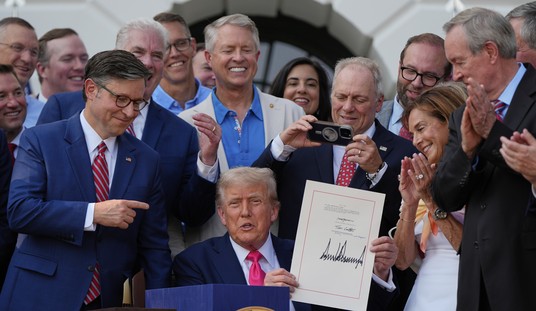Although I couldn’t disagree more strenuously than I do with the authors, as a service to Tatler readers, I will note that two law professors, Eric (son of Richard) Posner of the University of Chicago Law School and Adrian Vermeule of the Harvard Law School, have published an op-ed in today’s New York Times that asserts:
President Obama should announce that he will raise the debt ceiling unilaterally if he cannot reach a deal with Congress. Constitutionally, he would be on solid ground. Politically, he can’t lose. The public wants a deal. The threat to act unilaterally will only strengthen his bargaining power if Republicans don’t want to be frozen out; if they defy him, the public will throw their support to the president. Either way, Republicans look like the obstructionists and will pay a price.
As SNL’s Church Lady would say, “Well, isn’t that convenient.” When the professors say, “Politically, he can’t lose,” what they actually mean is, “in blue states where Obama is still popular, he can’t lose.” They have no idea what this tactic would do to incite those no longer drinking the Kool-Aid, or who never drank it in the first place, because they do not know such people.
Far more importantly, what their op-ed fails to mention is that for the president to raise the debt ceiling unilaterally is the third of four potential options, and the third-best (and second-worst), at that. The best would be a reduction of the deficit. The second-best would be for Congress to vote to raise the debt ceiling, an action that would kick the can down the road. The third option is the one championed by the co-authors of today’s op-ed piece. They also fail to mention that their solution to the problem is superior to only one other option: the worst, which would lead to fiscal chaos, further loss of confidence in the dollar, and conceivably a default on the American debt.
The professors also write, again ignoring the two better ways of resolving the current impasse:
The basic problem today is that the president and the House Republicans are locked in a classic bargaining game. The worst outcome for both is default on the debt, but each side holds out for a favorable deal. They will certainly go to the wire, but economists who have studied bargaining games have shown that there is always a real possibility of breakdown rather than compromise, because only by refusing to deal can each side convey the seriousness of its position. That is why labor strikes occur even though workers and managers do jointly better if they make a deal. Failure to raise the debt ceiling, however, is not akin to any old plant shutdown: it would be catastrophic.
It is beyond their imagining that the president is the obstructionist. But then, they live and work in the sacred precincts of elite academia, where free speech is rampant—-except when it comes to criticizing Barack Obama. They are unable to see that the president’s pouting, bullying and commanding others to do his bidding are not successful bargaining techniques. But then, he’s not a successful bargainer, a conclusion few law professors at Chicago or Harvard—or at any elite university— could dare to reach.









Join the conversation as a VIP Member